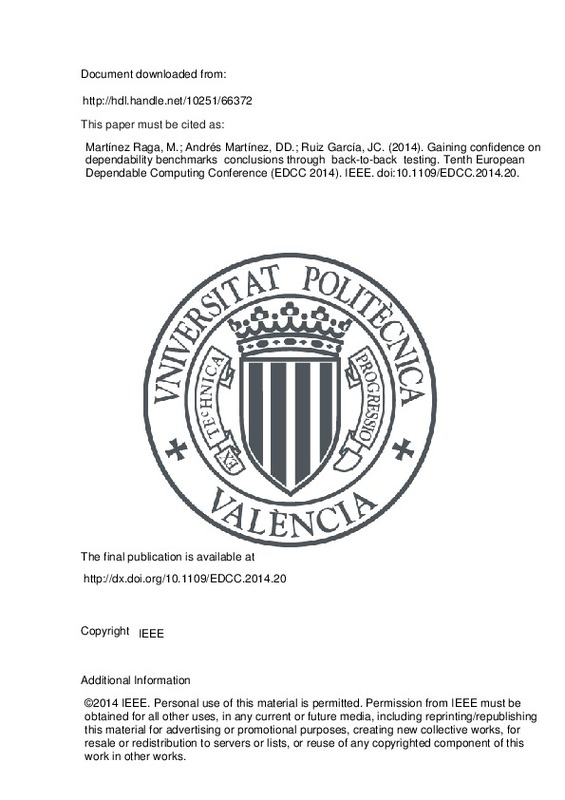JavaScript is disabled for your browser. Some features of this site may not work without it.
Buscar en RiuNet
Listar
Mi cuenta
Estadísticas
Ayuda RiuNet
Admin. UPV
Gaining confidence on dependability benchmarks conclusions through back-to-back testing
Mostrar el registro sencillo del ítem
Ficheros en el ítem
| dc.contributor.author | Martínez Raga, Miquel
|
es_ES |
| dc.contributor.author | Andrés Martínez, David de
|
es_ES |
| dc.contributor.author | Ruiz García, Juan Carlos
|
es_ES |
| dc.date.accessioned | 2016-06-23T11:55:32Z | |
| dc.date.available | 2016-06-23T11:55:32Z | |
| dc.date.issued | 2014-05-13 | |
| dc.identifier.isbn | 978-1-4799-3803-2 | |
| dc.identifier.uri | http://hdl.handle.net/10251/66372 | |
| dc.description | ©2014 IEEE. Personal use of this material is permitted. Permission from IEEE must be obtained for all other uses, in any current or future media, including reprinting/republishing this material for advertising or promotional purposes, creating new collective works, for resale or redistribution to servers or lists, or reuse of any copyrighted component of this work in other works. | es_ES |
| dc.description.abstract | The main goal of any benchmark is to guide decisions through system ranking, but surprisingly little research has been focused so far on providing means to gain confidence on the analysis carried out with benchmark results. The inclusion of a back-to-back testing approach in the benchmark analysis process to compare conclusions and gain confidence on the final adopted choices seems convenient to cope with this challenge. The proposal is to look for the coherence of rankings issued from the application of independent multiple-criteria decision making (MCDM) techniques on results. Although any MCDM method can be potentially used, this paper reports our experience using the Logic Score of Preferences (LSP) and the Analytic Hierarchy Process (AHP). Discrepancies in provided rankings invalidate conclusions and must be tracked to discover incoherences and correct the related analysis errors. Once rankings are coherent, the underlying analysis also does, thus increasing our confidence on supplied conclusions. | es_ES |
| dc.description.sponsorship | Work partially supported by the Spanish project ARENES (TIN2012-38308-C02-01). | es_ES |
| dc.format.extent | 8 | es_ES |
| dc.language | Inglés | es_ES |
| dc.publisher | IEEE | es_ES |
| dc.rights | Reserva de todos los derechos | es_ES |
| dc.subject.classification | ARQUITECTURA Y TECNOLOGIA DE COMPUTADORES | es_ES |
| dc.title | Gaining confidence on dependability benchmarks conclusions through back-to-back testing | es_ES |
| dc.type | Comunicación en congreso | es_ES |
| dc.identifier.doi | 10.1109/EDCC.2014.20 | |
| dc.relation.projectID | info:eu-repo/grantAgreement/MINECO//TIN2012-38308-C02-01/ES/ADAPTIVE AND RESILIENT NETWORKED EMBEDDED SYSTEMS/ | es_ES |
| dc.rights.accessRights | Abierto | es_ES |
| dc.contributor.affiliation | Universitat Politècnica de València. Departamento de Informática de Sistemas y Computadores - Departament d'Informàtica de Sistemes i Computadors | es_ES |
| dc.contributor.affiliation | Universitat Politècnica de València. Instituto Universitario de Aplicaciones de las Tecnologías de la Información - Institut Universitari d'Aplicacions de les Tecnologies de la Informació | es_ES |
| dc.description.bibliographicCitation | Martínez Raga, M.; Andrés Martínez, DD.; Ruiz García, JC. (2014). Gaining confidence on dependability benchmarks conclusions through back-to-back testing. IEEE. https://doi.org/10.1109/EDCC.2014.20 | es_ES |
| dc.description.accrualMethod | S | es_ES |
| dc.relation.conferencename | Tenth European Dependable Computing Conference (EDCC 2014) | es_ES |
| dc.relation.conferencedate | May 13-16, 2014 | es_ES |
| dc.relation.conferenceplace | Newcastle upon Tyne, UK | es_ES |
| dc.relation.publisherversion | http://dx.doi.org/10.1109/EDCC.2014.20 | es_ES |
| dc.type.version | info:eu-repo/semantics/publishedVersion | es_ES |
| dc.relation.senia | 267145 | es_ES |
| dc.contributor.funder | Ministerio de Economía y Competitividad | es_ES |







![[Cerrado]](/themes/UPV/images/candado.png)

